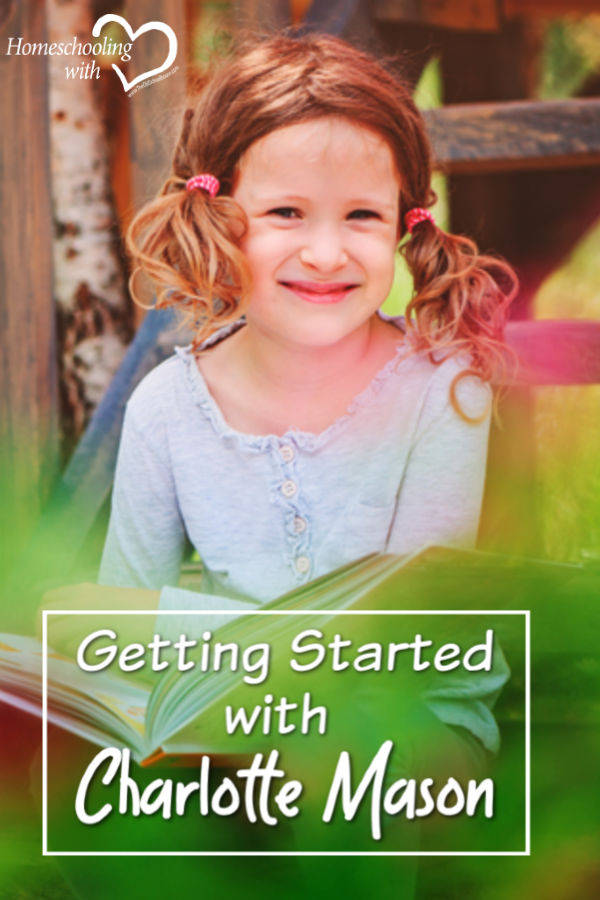Getting Started with Charlotte Mason


Getting started with Charlotte Mason can seem overwhelming. If you ask inside a homeschool centered Facebook group “What is Charlotte Mason?”, you will soon be inundated with phrases like:
“It’s reading lots of living books.“
“Nature study and lots of time outside.“
“It’s great for the early years but not enough for older students. You’ll have to move to something else then.“
Friend, I’m here to help. As a home educating mama, I have been learning and living the Charlotte Mason method for 6 years. I’m still gleefully learning more every day.
First, let me remind you that a method is not a formula to be followed but rather a compass to direct you through the unique geography of home educating your children.
The Charlotte Mason method is such a rich philosophy! Full of truth, goodness, and beauty and founded on the faith of Miss Mason and her recognition that every child is born a full person created in the image of God and full of possibilities to choose good, to do right, and to fulfill their Kingdom purpose.
Charlotte Mason defined 20 principles for her educational philosophy. Knowing these 20 principles is the first step to implementing the Charlotte Mason method in your homeschool. Once you have these principles down, you have the perfect compass for navigating this home education journey with your precious children!
Charlotte Mason’s 20 Principles
- Children are born persons. (This is not an admonition for “child-led” learning!) There’s a reason this is the 1st principle. Below is a little glimpse into how Charlotte Mason viewed people as divine mysteries, capacious and beyond our powers of measurement.
- The mystery of a person is indeed divine, and the extraordinary fascination of history lies in this, that this divine mystery continually surprises us in unexpected places. Like Jacob, we cry, before the sympathy of the savage, the courtesy of the boor: “ God is in this place and I knew it not.” We attempt to define a person, the most commonplace person we know, but he will not submit to bounds: some unexpected beauty of nature breaks out; we find he is not what we thought, and begin to suspect that every person exceeds our power of measurement. – Charlotte Mason, Children are Born Persons, The Parents’ Review, volume 22, June, 1911
- Children are born with a will to choose good or evil.
- Teach children the habit of obedience and to respect authority.
- Train your children without the use of manipulation by using daily tools like habit training and nature study.
- These principles are limited by the respect due to the personality of children, which must not be encroached upon whether by the direct use of fear or love, suggestion or influence, or by undue play upon any one natural desire.
- Charlotte Mason’s 3 key elements of education –
- Therefore, we are limited to three educational instruments—the atmosphere of environment, the discipline of habit, and the presentation of living ideas. The P.N.E.U. Motto is “Education is an atmosphere, a discipline, and a life.”
- “Education as an atmosphere” means the cultivation of the surroundings of the child to make the environment one of natural learning.
- When we say that “education is an atmosphere,” we do not mean that a child should be isolated in what may be called a ‘child-environment’ especially adapted and prepared but that we should take into account the educational value of his natural home atmosphere, both as regards persons and things, and should let him live freely among his proper conditions. It stultifies a child to bring down his world to the child’s level.
- Education is a discipline. Discipline, as used by Charlotte Mason, is a reference to the discipling (teaching) of our children, not punitive consequences.
- By “education is a discipline,” we mean the discipline of habits, formed definitely and thoughtfully, whether habits of mind or body. Physiologists tell us of the adaptation of brain structures to habitual lines of thought, i.e. to our habits.
- Education is a life.
- In saying that “education is a life,” the need of intellectual and moral as well as of physical sustenance is implied. The mind feeds on ideas, and therefore children should have a generous curriculum.
- Build upon the child’s natural curiosity.
- We hold that the child’s mind is no mere sac to hold ideas, but is rather, if the figure may be allowed, a spiritual organism with an appetite for all knowledge. This is its proper diet with which it is prepared to deal and which it can digest and assimilate as the body does foodstuffs.
- Build learning skills to gain knowledge.
- Such a doctrine as e.g. the Herbartian, that the mind is a receptacle, lays the stress of education (the preparation of knowledge in enticing morsels duly ordered) upon the teacher. Children taught on this principle are in danger of receiving much teaching with little knowledge, and the teacher’s axiom is “what a child learns matters less than how he learns it.”
- Feed the child’s mind with a generous curriculum.
- But we, believing that the normal child has powers of mind which fit him to deal with all knowledge proper to him, give him a full and generous curriculum, taking care only that all knowledge offered him is vital, that is, that facts are not presented without their informing ideas. Out of this conception comes our principle that,—
- Let the natural relations build connections.
- Education is the Science of Relations; that is, that a child has natural relations with a vast number of things and thoughts so we train him upon physical exercises, nature lore, handicrafts, science and art, and upon many living books, for we know that our business is not to teach him all about anything but to help him make valid as many as may be of— “Those first-born affinities that fit our new existence to existing things.
- Provide a feast of knowledge!
- In devising syllabus for a normal child of whatever social class, three points must be considered:(a) He requires much knowledge, for the mind needs sufficient food as much as does the body. (b) The knowledge should be various, for sameness in mental diet does not create appetite (i.e., curiosity). (c) Knowledge should be communicated in well-chosen language because his attention responds naturally to what is conveyed in literary form.
- Narration is a foundational tool for learning.
- As knowledge is not assimilated until it is reproduced, children should ‘tell back’ after a single reading or hearing or should write on some part of what they have read.
- One reading of a passage for narration is sufficient.
- Principle 15: A single reading is insisted on because children have naturally great power of attention; but this force is dissipated by the re-reading of passages and also by questioning, summarizing, and the like.
- Use the Right Way to guide moral and intellectual growth.
- There are two guides to moral and intellectual self-management to offer to children, which we may call ‘the way of the will’ and ‘the way of the reason.’
- Occupy a child’s time with positive conditions.
- The way of the will: Children should be taught (a) to distinguish between ‘I want’ and ‘I will.’ (b) That the way to will effectively is to turn our thoughts from that which we desire but do not will. (c) That the best way to turn our thoughts is to think of or do some quite different thing, entertaining or interesting. (d) That after a little rest in this way, the will returns to its work with new vigor.
- Use reasoning skills only for mathematical truth (for young children).
- The way of reason: We teach children too, not to ‘lean (too confidently) to their own understanding’ because the function of reason is to give logical demonstration (a) of mathematical truth (b) of an initial idea, accepted by the will. In the former case, reason is, practically, an infallible guide, but in the latter, it is not always a safe one for whether that idea be right or wrong, reason will confirm it by irrefragable proofs.
- Moral principles will lead children to make the right decision.
- Therefore, children should be taught, as they become mature enough to understand such teaching, that the chief responsibility which rests on them as persons is the acceptance or rejection of ideas. To help them in this choice, we give them principles of conduct and a wide range of the knowledge fitted to them. These principles should save children from some of the loose thinking and heedless action which cause most of us to live at a lower level than we need.
- A child’s spiritual and mental life are intertwined.
- We allow no separation to grow up between the intellectual and ‘spiritual’ life of children but teach them that the Divine Spirit has constant access to their spirits and is their Continual Helper in all the interests, duties, and joys of life.
And there you have the 20 Principles of a Charlotte Mason education. If you follow and implement these principles as your guideposts, it will serve you and your children well.
 Lara is a saved-by-grace encourager, wife to a wonderful man, and the mama to two precious and precocious boys. Lara believes you are the gate-keeper, grace-giver, and cultivator of your home – a sacred space – and when you step into your God-given capacity you are capable of providing a delightful and life-giving education to your children. Lara has been homeschooling her own children for 6 years, and was blessed to be a homeschool mother’s helper to a Charlotte Mason mama for 3 years before having her own family. You can find her sharing resources and encouragement at Everyday Graces Homeschool.
Lara is a saved-by-grace encourager, wife to a wonderful man, and the mama to two precious and precocious boys. Lara believes you are the gate-keeper, grace-giver, and cultivator of your home – a sacred space – and when you step into your God-given capacity you are capable of providing a delightful and life-giving education to your children. Lara has been homeschooling her own children for 6 years, and was blessed to be a homeschool mother’s helper to a Charlotte Mason mama for 3 years before having her own family. You can find her sharing resources and encouragement at Everyday Graces Homeschool.













































